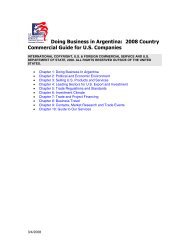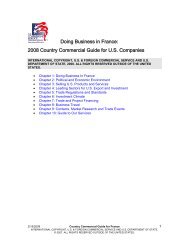Doing Business In Saudi Arabia - Bna
Doing Business In Saudi Arabia - Bna
Doing Business In Saudi Arabia - Bna
You also want an ePaper? Increase the reach of your titles
YUMPU automatically turns print PDFs into web optimized ePapers that Google loves.
Sale of arms and ammunitions is managed through a Foreign Military Sales (FMS)<br />
program of the U.S. Department of Defense. The U.S. Military Training Mission<br />
(USMTM) established at Dhahran in 1953 (now located in Riyadh) provides training,<br />
advice and assistance to the <strong>Saudi</strong> Ministry of Defense and Aviation in a variety of<br />
areas, including the management of the Kingdom’s Foreign Military Sales (FMS).<br />
Temporary Entry Return to top<br />
For temporary entry of goods for promotional purposes, importers need an invoice with<br />
the value of the goods endorsed by the U.S.-<strong>Saudi</strong> <strong>Business</strong> Council or the chamber<br />
of commerce, and a certificate of origin. The invoice should state that the goods are<br />
being imported for exhibition purposes only and will be re-exported.<br />
<strong>Saudi</strong> Customs requires a deposit for these goods (equivalent to the applicable tariff<br />
rate on the total value of the goods). This deposit is refundable when the exhibition is<br />
over and upon showing a document that the owner of the equipment officially<br />
participated in a trade show. Additionally, the customs authorities will collect handling<br />
charges. Reimbursement takes between two to four weeks.<br />
Labeling and Marking Requirements Return to top<br />
Labeling and marking requirements are compulsory for any products exported to <strong>Saudi</strong><br />
<strong>Arabia</strong>. The <strong>Saudi</strong> <strong>Arabia</strong>n Standards Organization (SASO) is responsible for<br />
establishing labeling and other guidelines in <strong>Saudi</strong> <strong>Arabia</strong>. The Ministry of Commerce<br />
and <strong>In</strong>dustry implements SASO guidelines through its inspection and test laboratories<br />
at ports of entry in <strong>Saudi</strong> <strong>Arabia</strong>.<br />
Labeling is particularly important for companies marketing food products, personal<br />
care products, health care products, and pharmaceuticals. SASO has specific<br />
requirements for identifying marks and labels for various imported items. Labels must<br />
be in Arabic for any imported foodstuff item, which should basically reveal the same<br />
information on the container as in the foreign language, i.e. ingredients, country of<br />
origin, manufacturer, shelf life, instructions for use, etc. All food products, whether<br />
imported for commercial purposes, display, or for sampling, must be fit for human<br />
consumption and should meet established shelf life requirements. The product(s)<br />
must have a label or sticker showing the statutory information such as product name,<br />
country of origin, producer's name and address, production and expiry/use by dates, in<br />
Arabic and English languages (samples imported must be labeled at least in English).<br />
It is vital that American exporters adhere to SASO quality standards and labeling<br />
regulations to avoid rejection of products at a <strong>Saudi</strong> port of entry. The method for<br />
writing production and expiry dates is to put the day of the month first, followed by<br />
month and year. Use of the system commonly followed in the United States, where<br />
the month is shown first, is not acceptable in <strong>Saudi</strong> <strong>Arabia</strong>. Products that do not meet<br />
5/13/2008












